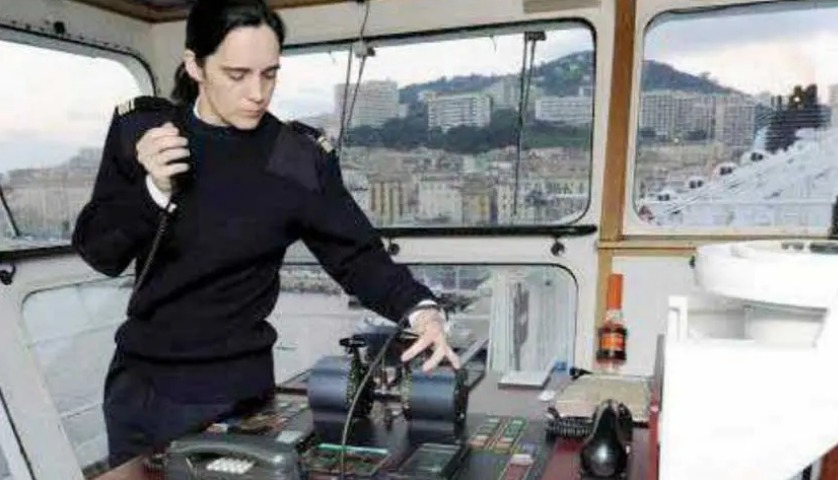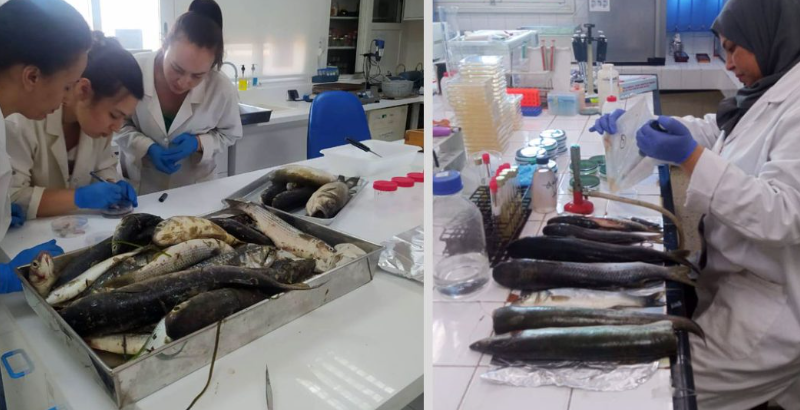Women represent an underutilized pool of skills that we need to compensate for the shortage of seafarers. However, with this proliferation of women on board, there is a growing awareness around the world about the violence and harassment on board ships, including sexual harassment, intimidation and sexual assault, which adds to already difficult working conditions for these women.
If in the past the only female presence on board was the figurehead, today women are making their entry into maritime transport, a phenomenon that is certainly still uncommon but which is growing.
Nearly thirty centuries later, the sea is once again taken by storm by bold navigators like women. We now find them in sailing races, captains on board patrol boats, officers on board passenger car ferries, at the dock operating in key logistics positions.
Indeed, even if the phenomenon is recent, women have been working on liners for a long time, since 1945. Since then, they have been increasingly present on cargo ships and other merchant ships. “For fifty years, the number of women employed on commercial and cruise ships has been increasing steadily,” notes Cleopatra Doumbia-Henry, director of the ILO’s Sectoral Activities Department.
According to her, “women represent only 1 to 2% of the 1.25 million seafarers recorded in the world”. However, “they constitute 17 to 18% of the cruise ship workforce. 94% of women seafarers work in passenger transport (including 68% on ferries and 26% on cruise ships) and 6% in goods transport (container ships, tankers, etc.). As for their jobs, some are captains, chief engineers or officers. But, overall, women are part of the hotel staff on ships that carry passengers,” she emphasizes. Of these, 51.2% come from Organization for Economic Co-operation and Development (OECD) countries, 23.6% from Eastern Europe, 9.8% from Latin America and Africa, 13.7% from the Far East and 1.7% from South Asia and the Middle East.
Harassment and other attacks
In response to this proliferation of women on board, there is growing awareness around the world about violence and harassment on board ships, including sexual harassment, intimidation and sexual assault, which add to the already difficult working conditions for these women.
The French Navy wants 50% more women by 2030.
Moreover, to support actions encouraging women to enter the maritime field, the Secretary General of the IMO, Mr. Arsenio Dominguez, declared in London that “We remain steadfast in our commitment to creating a safe and secure working environment. respectful on board. Recognizing that this is not only a moral imperative, but also a practical necessity for the sustainable growth of the sector, we are committed to preventing and combating acts of intimidation and harassment in the maritime sector. Our common objective is clear: to meet the expectations of seafarers, the sector, administrations and the general public by ensuring that the maritime transport sector is free from any form of aggression. For his part, the Director of the ILO Sectoral Policies Department (Sector), Mr. Frank Hagemann, stressed in this regard that it is “essential that we do everything in our power to resolve the problems that can lead experienced seafarers to leave the sea or dissuade young women from entering the profession. Any form of intimidation and harassment, or violence and harassment, is in direct contradiction to the very concept of decent work. There should be zero tolerance for this type of behavior.” To this end, the Secretary General of the IMO encourages Member States, in his message, to act so that “women can be trained in the same way as men in their maritime institutes and thus acquire the high level of competence required for work in the sector.
Moreover, the IMO acts in favor of gender equality and the empowerment of women by granting scholarships to women, allowing them to more easily access high-level technical training in the maritime sector. developing countries and creating a favorable environment for the identification and selection of women, through their authorities, for career advancement in maritime administrations, ports and maritime training establishments.
Tripartite Working Group takes action
To this end, a meeting of the Joint ILO/IMO Tripartite Working Group, which includes representatives of governments, ship owners and seafarers, was held recently at the IMO headquarters in London (United Kingdom). , to discuss possible future measures to prevent and address this serious problem, including through legislation, mechanisms and policies, as well as enhanced training.
After three days of deliberations, the Joint ILO/IMO Tripartite Working Group agreed on several recommendations to submit to the IMO Maritime Safety Committee at its next meeting in May 2024 (MSC 108) and to the ILO Governing Body in due course.
Harmonized terminology
The Joint Tripartite Working Group recommended the use of the terminology “violence and harassment, including sexual harassment, intimidation and sexual assault” in relevant IMO and ILO instruments and recommendations , to reflect their relevance in the maritime sector and recommended consideration of an updated set of amendments to the Code of Training, Certification and Watchkeeping for Seafarers. These are mandatory minimum requirements for safety familiarization training and basic training and education for all seafarers.
The draft amendments ensure that seafarers have basic knowledge and understanding regarding violence and harassment, including sexual harassment, intimidation and sexual assault, as well as how to prevent incidents and intervene.
Measures for administrations and shipping companies
In the same vein, the Joint Tripartite Working Group recommended considering the adoption of measures, applicable to administrations and shipping companies around the world, to combat violence and harassment, including sexual harassment, acts bullying and sexual assault.
These measures would support the implementation of IMO safety requirements for the management and operation of ships at sea and include: the integration of relevant policies and procedures into safety management systems, including support for victims and protection against reprisals; in addition to establishing additional safety management objectives for the company, including assessing risks and implementing protective measures; specifying that safety management systems must ensure compliance with mandatory safety rules and regulations, including national requirements, and that recommendations developed by maritime transport sector organizations are respected; distribute responsibilities among senior management and company administrations to handle reported cases, and provide resources required to respond, including medical care and mental health support for victims; and ensure training and familiarization of seafarers and designated shore-based personnel on company policies and their implementation.
Dismiss the perpetrators of these acts
Finally, the Joint Tripartite Working Group recommended tasking the Subcommittee on Human Element, Training and Monitoring to consider the proposal to include a new requirement in Regulation I/5 (National Provisions) of the International Convention on Standards of Training, Certification and Watchkeeping for Seafarers, 1978. This requirement would imply the suspension or termination of the certificates of any sailor convicted of sexual assault, which would have the effect of dismissing the perpetrators of these acts.
The Joint Tripartite Working Group also recommended that, in coordination with the World Health Organization, actions taken following its meeting be taken into account when amending the International Medical Guide for Ships, Third Edition, or when reviewing national and sector medical guides.
International awareness campaign
The launch of a joint ILO-IMO international campaign, with the support of ILO and IMO Member States, seafarers, ship owners, governmental and non-governmental organizations, to raise public awareness to this question, was also mentioned. This involves encouraging governments to launch national campaigns in collaboration with social partners and other national organizations.
The Joint Tripartite Working Group requested the IMO and ILO secretariats to explore ways of collecting data, in an appropriate manner, on violence and harassment, including sexual harassment, acts of bullying and sexual assault in the maritime sector.
A normal social environment
Indeed, the presence of women on board ships creates a more normal social environment, which is all the more important as the living conditions of sailors have changed in recent years. There are fewer personnel on board and they spend less time on land. The presence of women among the crew reduces the feeling of isolation that sailors often suffer from. In addition, recent studies on work in the maritime sector indicate a growing shortage of certain categories of seafarers, and officers in particular. This is why women also constitute an underutilized reserve of skills that we need to compensate for this shortage.




